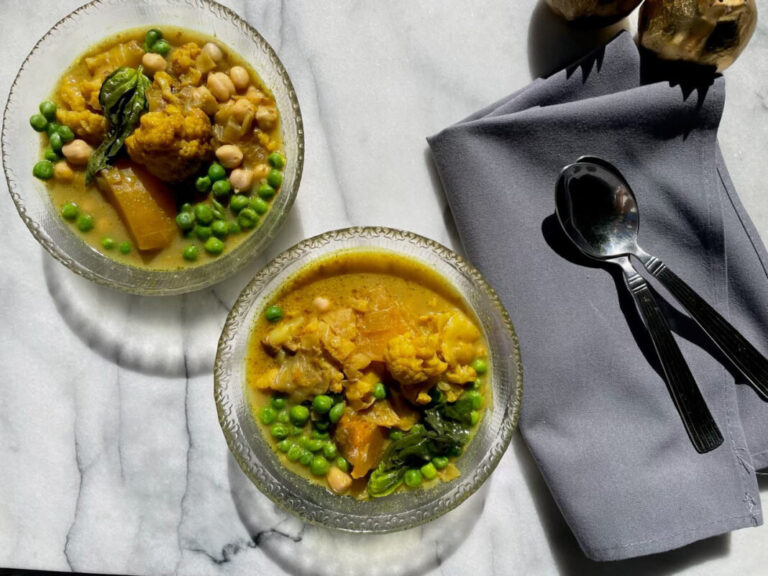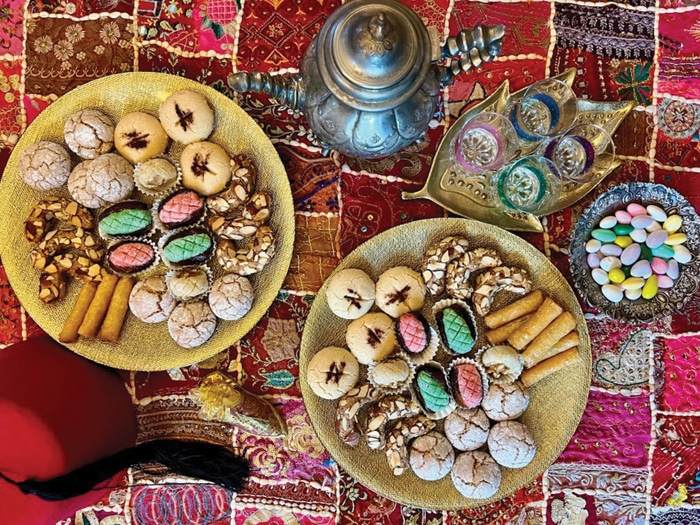A Cheesy Burekas Story
Cheese burekas are the perfect package—the short crust pastry has just the right amount of crispy flakiness and the filling combines the rich salty, buttery tang of feta and the sharp, intricate flavor of Parmesan with the comforting creaminess of mashed potato.

When Rachel’s husband Neil was eight years old, his maternal grandmother passed away. He missed her a lot. He especially missed the delicious burekas, boyos and bulemas that she used to lovingly prepare for him, her only grandchild.
The first Halloween after her passing, he went trick-or-treating in the very Sephardic and Ladino-speaking area of Leimert Park. He waited patiently behind a long line of kids at the home of “auntie” Bohora Benveniste. When he got to the door, she kindly put a candy in his pumpkin, not recognizing him in his costume. Neil let out a plaintive wail “Don’t you have any burekas for me?” Poor Bohora let out a Ladino-accented shriek. She took him by the hand to her kitchen, opened the freezer, pulled out a big bag of burekas and dropped some in his pumpkin!
You’re probably thinking, wait wasn’t that puff pastry going to get all crumbly in his pumpkin?
Well, no. We’re not talking about the puff pastry burekas that are so common in Israel. Or even about the flaky filo-wrapped Turkish style burekas.
The burekas Neil craved are the authentic Sephardic version that originated in Ottoman Turkey after the expulsion of the Jews from Spain and Portugal.
When the Turks from Cental Asia went to the country of Turkey, they brought their deep-fried “burga” dumplings with them. Burga were layers of bread like dough with a stuffing. In Turkey, these dumplings evolved into “burek,” large round cheese and meat filled pies made with filo pastry.
By the early 15th century, burek were a distinctive feature of Ottoman cuisine and had spread across the empire to Armenia, Greece, Albania and Bulgaria.
When the Jews of Andalusia sought refuge in Istanbul, Izmir and the other cities of the Ottoman Empire, they brought with them their Spanish tradition of empanadas. Soon the ground meat, spinach, eggplant and especially the cheese fillings of the burek were incorporated into the shortcrust dough of the empanadas and burekas were born.
Cheese burekas are the perfect package—the short crust pastry has just the right amount of crispy flakiness and the filling combines the rich salty, buttery tang of feta and the sharp, intricate flavor of Parmesan with the comforting creaminess of mashed potato.
— Sharon
My husband wasn’t deprived of those Sephardic baked delicacies for very long. The sweet old ladies in the Rhodesli community were happily sharing their burekas, pastelikos (little meat-filled pies) and biscochos with cute “Neiliko.”
When his mother Becky retired from her full-time job with the Army Corps of Engineers, she found time to spend in the kitchen. She quickly mastered the fine art of baking burekas, bulemas and the rest.
For years, my mother in law would fill our freezer with burekas made in perfectly shaped half moons, with beautifully crimped edges. I’m so grateful that she took the time to teach my daughter Rebekah and I how to make burekas before she retired from the kitchen.
I STILL HAVEN’T MASTERED THE ART OF CRIMPING, SO I TAKE THE EASY WAY OUT AND MAKE THEM IN A SIMPLE CRESCENT SHAPE.
I still haven’t mastered the art of crimping, so I take the easy way out and make them in a simple crescent shape.
I learned a few tricks along the way. First was to halve her recipe, so I wouldn’t have an overwhelming amount of burekas to shape and bake. Second, allowing the dough to relax for half an hour makes the dough easier to handle. Third, making the burekas small and cocktail size allows you to serve them alongside other foods, without your guests filling up too quickly.
Rebekah and I will bake a batch of burekas every so often. She keeps some in her dorm freezer for a quick snack. I keep some in the freezer for an easy Shabbat lunch served the traditional Ladino way with “huevos haminados,” salty feta and kalamata olives.
Let’s raise a glass of ouzo.
Salud y beraha! L’chaim!
— Rachel
Cheesy Burekas
Filling
2 large russet potatoes
1/2 pound of feta cheese, crumbled
1 cup parmesan cheese
2 eggs
Boil the potatoes in a pot over medium heat until fork tender, 7-10 minutes.
Peel the potatoes, mash and let cool.
Add feta and parmesan cheese and eggs and mix all the ingredients.
Dough
1 cup cold water
3/4 cup avocado or vegetable oil
1 teaspoon kosher salt
3 cups all purpose unbleached flour
1 egg, beaten for egg wash
Parmesan cheese, sesame or nigella
seeds for sprinkling on top
- Use a standing mixer with the dough hook and mix all the ingredients until the dough comes together, about 3 to 5 minutes.
- Form the dough into walnut-size balls.
- Place on a parchment lined baking tray, cover with a clean dish towel and let rest for 30 minutes.
- Preheat oven to 350°F.
- Use a rolling pin to form the dough into oval shapes.
- Place one teaspoon of potato filling in the middle of the dough.
- Lift the dough upwards, fold over the filling and then pinch the ends and bring in to form a crescent shape.
- Brush the tops of the burekas with a beaten egg.
- Sprinkle tops with parmesan cheese and seeds, if using. Bake for 20-25 minutes until crispy and golden brown.
Sharon Gomperts and Rachel Emquies Sheff have been friends since high school. They love cooking and sharing recipes. They have collaborated on Sephardic Educational Center projects and community cooking classes. Follow them on Instagram @sephardicspicegirls and on Facebook at Sephardic Spice SEC








I am Ashkenazi decent from Russia but love love love the Sephardic cuisine and kitchen. I also love to cook and challenge myself often. I am so excited to come across your Insta and now am following you and opened up your site to save your recipes! I am going to make your Dafina for Shabbat! I cannot wait to taste it 🙂
Thank you again!!!
I am Ashkenazi decent from Russia but love love love the Sephardic cuisine and kitchen. I also love to cook and challenge myself often. I am so excited to come across your Insta and now am following you and opened up your site to save your recipes! I am going to make your Dafina for Shabbat! I cannot wait to taste it 🙂
Thank you again!!!
How was the dafina? Thank you for following us!